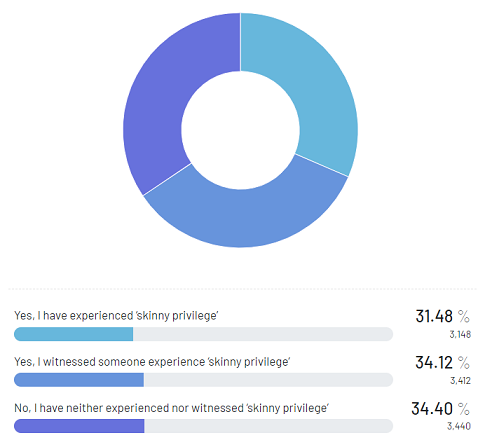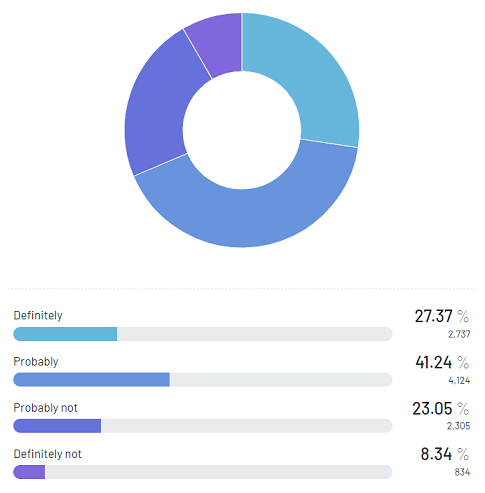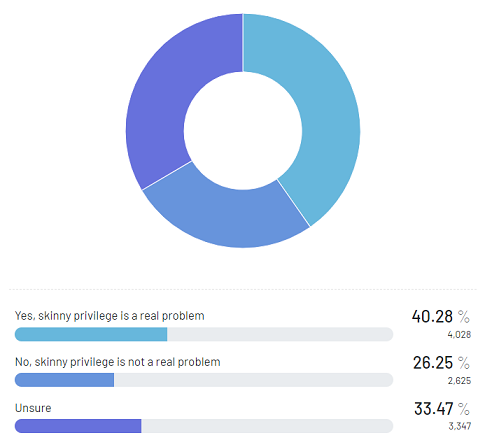 34% Of Respondents Have Not Experienced or Witnessed Skinny Privileged Individuals
34% Of Respondents Have Not Experienced or Witnessed Skinny Privileged IndividualsSkinny privilege refers to the phenomenon where individuals who have lost weight receive preferential treatment in society compared to those who haven’t. The term gained popularity after women shared their experiences on TikTok.
Actress and motivational speaker Meg Stier recounted how people’s attitudes towards her changed when she went from a size 18 to a size 6, with increased attention and respect. Stier also believes that her acting career benefited from her weight loss. While skinny privilege can provide advantages, it also perpetuates body and weight issues and raises concerns about discrimination.
The hashtag #skinnyprivilege has gained significant traction on TikTok, indicating its growing prominence in social media discussions. Real Research, an online survey app, conducted a survey to gain further insights into public opinion on this topic and explore the views and experiences related to skinny privilege.
Highlights:
- More than half (68.22%) of respondents are aware of the term “skinny privilege.”
- 39.08% believe people with higher body weight suffer from skinny privilege.
- 40.28% consider skinny privilege comparable to racism.
Nowadays, discussions surrounding body image, weight, and beauty standards have become increasingly prevalent. One such concept that has gained attention is “skinny privilege.”
This concept has sparked conversations about societal biases and the impact of physical appearance on how individuals are perceived and treated. To gain further insights into public opinion on this topic, a survey was conducted to explore the views and experiences related to skinny privilege. Let’s delve into the findings and shed light on this intriguing subject.
According to the survey on skinny privilege, we found that the majority of the respondents (68%) were aware of the emerging trend of skinny privilege, while 32% were unaware.
In the subsequent poll, we sought to understand the respondents’ personal encounters and experiences related to skinny privilege. Based on the data collected, 31% of the respondents reported having personally experienced skinny privilege. Additionally, 34% observed someone else experiencing skinny privilege, while another 34% indicated that they neither encountered nor personally experienced this phenomenon.

Meg Stier’s Opinion on Thin Privilege
Meg Stier, a renowned actor and motivational speaker residing in New York City, openly discussed the revelations she had after undergoing significant weight loss. Stier expressed her newfound awareness of certain aspects she wished she had known beforehand, such as the constant feeling of coldness that accompanied her transformation.
She emphasized that losing weight resulted in noticeable changes in how people treated her, highlighting the existence of what she termed “skinny privilege.” According to Stier, she found that “people treat you differently” when you lose weight, and “skinny privilege is a thing.”
People started to respect me a lot more when I lost weight, which is just disgusting; there’s a lot of skin. There’s a lot of skin.
When we asked the respondents’ stance on Stier’s viewpoint regarding the unfair bias against individuals with higher body weights, we sought to determine if they agreed or disagreed. Additionally, we explored whether they believed other contributing factors might be involved in this phenomenon.
39% of respondents believed that people with a higher body weight suffer from an unfair bias against them, and 27% stated that there were other factors involved. A notable 34% remained undecided.
Examining the Social and Financial Advantages of Skinny Privilege
Subsequently, the survey poll asked the respondents whether individuals like Stier, who is slim, tend to experience social and financial advantages better than others.

Four-in-ten respondents (41%) stated probably, 27% stated definitely, 23% stated probably not, and 8% said definitely not.
Furthermore, when Stier mentioned that she experienced a significant increase in respect from others after her weight loss, we inquired about the respondents’ reactions to her comments.
Based on the responses received, the reactions to Meg Stier’s comments about gaining increased respect after weight loss can be categorized as follows:
- Negative reactions: Approximately 6% of the respondents expressed anger, 4% felt frustrated, and 6% were confused by her remarks.
- Neutral/indifferent reactions: Around 7% of the respondents indicated being indifferent to Stier’s comments.
- Positive/supportive reactions: Approximately 8% of the respondents felt sympathetic, 6% felt empathetic, 10% agreed with her viewpoint, 7% disagreed, 14% were concerned, and 13% showed support for Stier’s perspective.
Meanwhile, 18% of respondents stated other reasons.
Is Skinny Privilege Harmful to Everyone?

In this survey poll, most respondents (57%) stated that skinny privilege is harmful to a select group of people, compared to 43% who said it is harmful to everyone.
Lastly, we asked respondents if they thought thin privilege was an issue on par with racism. The results showed that 40% believed that skinny privilege is a problem, 26% said otherwise, and 34% were unsure.
Methodology | |
| Survey Title | Survey on ‘Skinny Privilege’ |
| Duration | June 22, 2023 – June 29, 2023 |
| Number of Participants | 10,000 |
| Demographics | Males and females, aged 21 to 99 |
| Participating Countries | Afghanistan, Algeria, Angola, Argentina, Armenia, Australia, Azerbaijan, Bahrain, Bangladesh, Belarus, Benin, Bolivia,… Brazil, Brunei, Bulgaria, Burkina Faso, Cambodia, Cameroon, Canada, Chile, China, China (Hong Kong) China (Macao), China (Taiwan), Colombia, Costa Rica, Croatia, Czech Republic, Ecuador, Egypt, El Salvador, Ethiopia, Finland, France, Gambia, Georgia, Germany, Ghana, Greece, Greanada, Guatemala, Honduras, Hungary, India, Indonesia, Iraq, Ireland, Israel, Italy, Ivory Coast, Japan, Jordan, Kenya, Kuwait, Kyrgyzstan, Latvia, Lebanon, Libya, Lithuania, Malaysia, Maldives, Maluritania, Mexico, Moldova, Mongolia, Morocco, Mozambique, Myanmar [Burma], Namibia, Nepal, Nicaragua, Nigeria, Oman, Pakistan, Palestine, Panama, Peru, Philippines, Poland, Portugal, Qatar, Romania, Russia, Saudi Arabia, Serbia, Sierra Leone, Singapore, Slovakia, South Africa, South Korea, Spain, Sri Lanka, Tanzania, Thailand, Togo, Tunisia, Turkey, Turkmenistan, Uganda, Ukraine, United Arab Emirates, United Kingdom, United States, Uruguay, Uzbekistan, Venezuela, Vietnam, Yemen, Zimbabwe. |
RR Author
Real Research News is the media platform that presents insights and studies of wide-range of topics. It focuses on insights gathered from its survey app.







